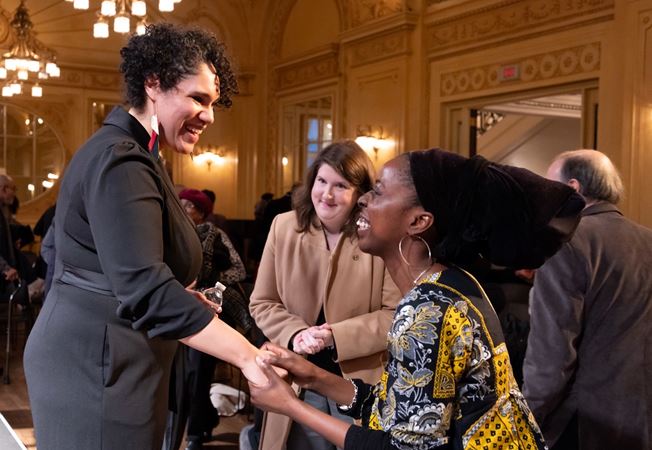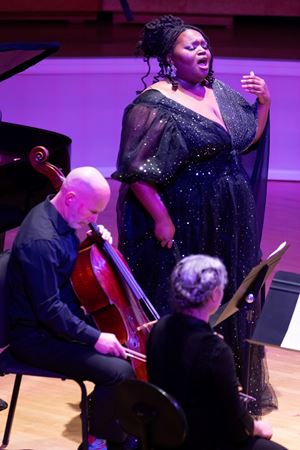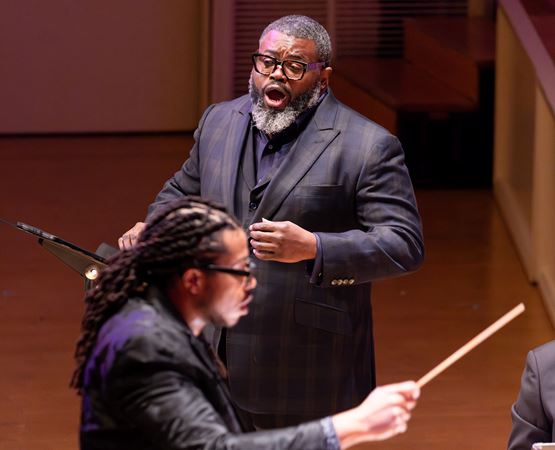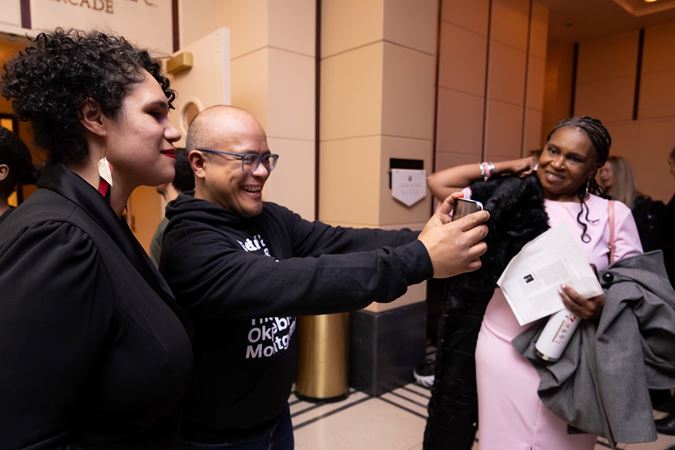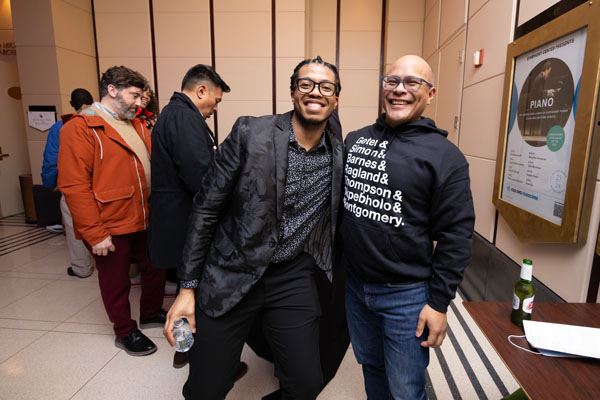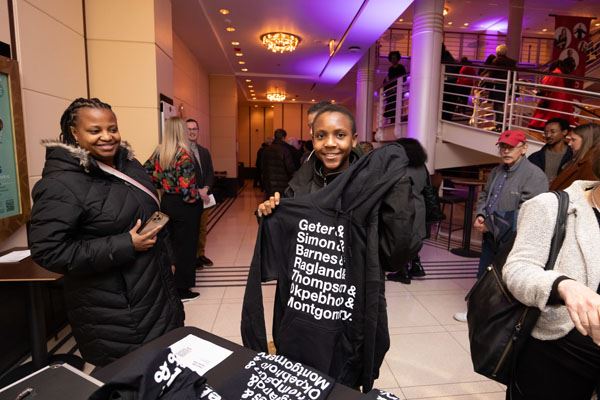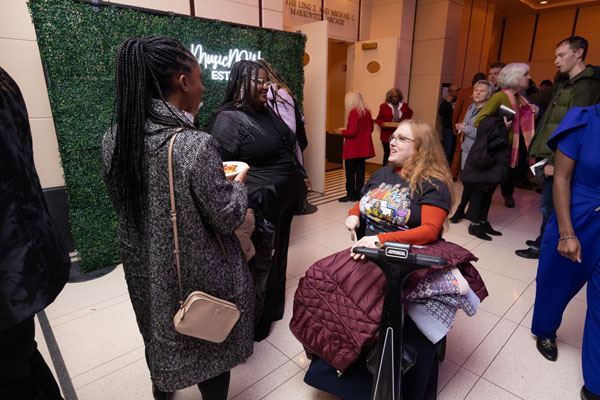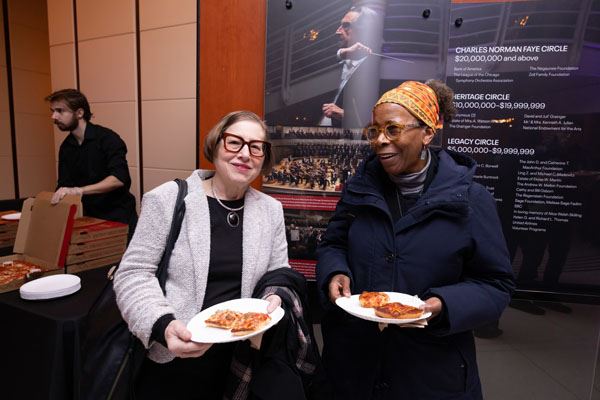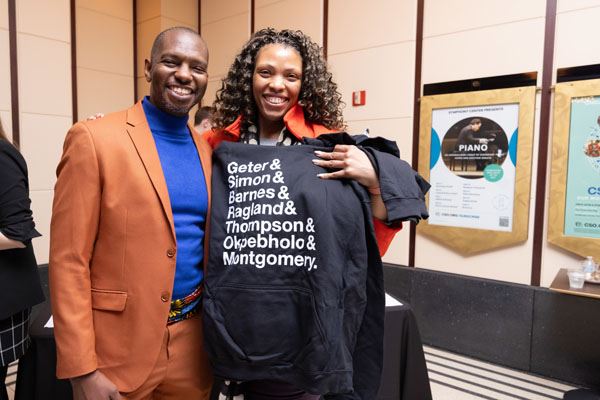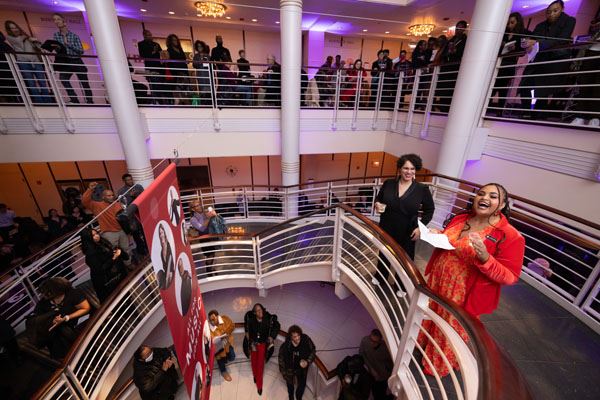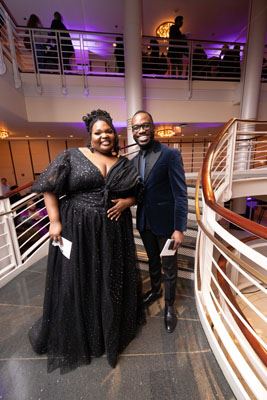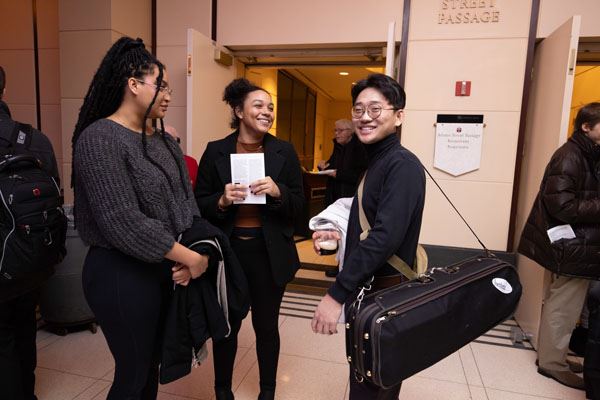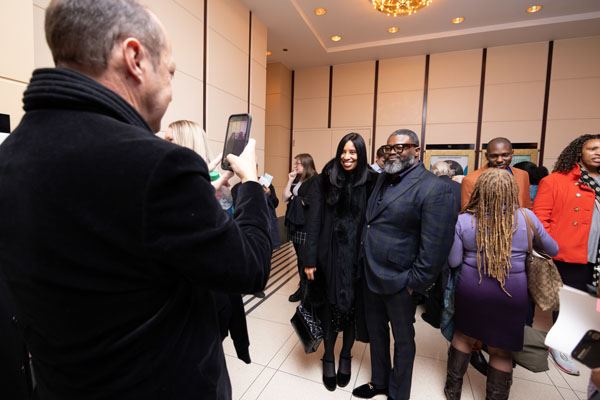Blacknificent 7 members Shawn Okpebholo (from left), Dave Ragland, Joel Thompson, Jasmine Barnes, Damien Geter, Jessie Montgomery and Carlos Simon take a bow after their MusicNOW concert Dec. 3.
Anne Ryan
“This is history in the making,” Jessie Montgomery, Mead Composer-in-Residence, reminded a MusicNOW audience several times, and her words were no idle boast.
The occasion was the debut of the Blacknificent 7, a collective of Black composers, all united in a mission of using music as a form of social activism. They and their works were featured on the season-opening concert Dec. 3 of the CSO MusicNOW series, presented at Orchestra Hall. Along with Montgomery, the Blacknificent composers are Shawn Okpebholo, Joel Thompson, Dave Ragland, Jasmine Barnes, Damien Geter and Carlos Simon. Their name is a play on the title of the hit Western film “The Magnificent Seven” (1960), whose theme by Elmer Bernstein remains immediately recognizable decades later.
Curated by Montgomery, the concert brought together CSO musicians, conductor Donald Lee III and tenor Russell Thomas, along with Montgomery on violin and Simon on piano in improvised interludes. It also marked the world premiere of Barnes’ chamber work The United States Welcomes You, commissioned by MusicNOW. Also performed were Ragland’s Eight Tones for Elijah, Thompson’s In Response to Madness and Geter’s Annunciation. After the concert, the CSO African American Network hosted a party in the Rotunda, where attendees were able to meet the artists and composers on the program and enjoy refreshments.
Before the performance, several Blacknificent 7 members gathered for a panel discussion, co-presented by Chicago Humanities and emceed by WFMT-FM host LaRob K. Rafael, in Grainger Ballroom.
Here’s a transcript of highlights from that discussion:
LaRob K. Rafael: I’m going to open with a quote from Francis Poulenc, somewhere around 1922. He said the diversity of our music, of our tastes and distastes, precluded any common aesthetic. So my first question: Is it true that you all were almost called Les Six Noir?
Jessie Montgomery: Yes, very true. For those who are not familiar with Les Six, it was a group of French composers around the turn of the 20th century; they formed this alliance with each other. Well, not an alliance, but more like a sense of camaraderie, and they bolstered each other’s music throughout that time. So before Carlos joined our group, we affectionately called ourselves Les Six Noir as a joke, and then when Carlos joined us, we said, what can we call ourselves now?
LaRob K. Rafael: Well, Blacknificent 7 is a fantastic name.
Shawn Okpebholo: That is Joel. That is Joel.
LaRob K. Rafael: Yes, thank you for that, Blacknificent 7. I can’t get enough of it, honestly. So for each of you, what would you say is the benefit of being in a composer collective like this?
Dave Ragland: I would say it’s probably like being a soundboard. To have a soundboard to bounce ideas off of to make sure that, you know, I’m not insane when I say I want to put cellos and French horns together to do this and that and whatnot.
Carlos Simon: It’s also like a good opportunity for us to just vent about non-musical things or even creative things, like, oh, I’m not making this deadline, y’all, I need some encouragement.That happens at least once a quarter. And we’re all there to help, chime in and even yes, give encouragement. To be an artist, that’s a very vulnerable space. And so to be so comfortable with a group of people and then saying I’m going to share this piece with you in hopes that it will get better.
Shawn Okpebholo: I would say for probably all of us, we are primarily in white spaces. But to be a part of a group of people who look like us and who are doing the same things as us, it’s quite amazing and life-giving. So we’re not alone. For years, I’m like, I’m the only one, and what am I doing? But no, no, no, I’m not.
By the way, we’re not the only ones. We’re just the ones on the text thread. There are a lot of us. And I want to make that clear, this is not an exclusive group. We’re just representing this new generation of really creative Black composers.
Joel Thompson: OK, I’m the sort of silent lurker on [our] text thread. Being a composer is a very solitary experience. And I want to second what Shawn shared, that it’s even more solitary for someone who is Black in the predominantly white space of classical music. So the group functions as a way for us to remedy that. But also there is a business aspect to this profession, and we can choose to be vulnerable about interacting with certain administrations and whatnot. Just who to watch out for, who will support you? So we have each other for that, so we are less likely to be taken advantage of.
Carlos asked a question at dinner last night: What is something that you want to celebrate that is not music-related? We had to dig into our souls and pull ourselves away from our desks to figure out what’s not musical that we can celebrate for each other. So like that. That’s what Blacknificent 7 provides for all of us.
LaRob K. Rafael: So thinking about Les Six for a moment, it was a movement seen as a sort of neo-classical rebellion against styles of Wagner and the Impressionism of Debussy and and others. It’s very obvious from the timing of your formation, when there were many, many institutions were calling for more representation, a more clear aspect of equity within the genre. Are there musical things that you think Blacknificent 7 brings forward in our field?
Jessie Montgomery: What’s special about what you’re going to experience this evening is how different our musics are. The stylistic treatments go all over the map. ... But there’s an expectation of what you’re supposed to do or what you may or may not be coming from as a Black artist. So I think what you’re going to hear tonight is just how we kind of crack all of that open and bring all these worlds together from our collective experiences. That’s one of the things that has been such a rewarding experience — to learn about each other’s music and realize that among us.
Dave Ragland: I tell my students that two things can be true at the same time. It’s raining and sunshine at the same time. And so being in the field of the arts, especially being Black or BIPOC, it’s like you go into the casting call, and think, oh, well, they already got somebody looks like me. Well, they’re going to pick only one or maybe two if we’re lucky. But when you have a conglomerate [like Blacknifcent 7], everyone really achieves more. So it really is an honor just to be in the number of Black composers, but also to be in this number of composers. And we’ll see tonight, hopefully, just that — an amazing and awesome synergy.
LaRob K. Rafael: Many of you have presented on some of the largest stages in the world already. But what does it feel like right now to be sitting together with your colleagues, presenting a concert at Symphony Center in Chicago?
Jessie Montgomery: I’m just going to say, first, because we spent at least a year-plus planning this concert, it’s just a joy to be here with you guys. It’s just a joy to be able to make music with friends. With all of us being here, we get to hang out and spend time in between rehearsals and continue to grow our friendships. I hope you’ll see that coming through in our performances.
Joel Thompson: One of the things that I’m realizing in this moment, and I have to take a breath, is that usually if my music is programmed, I feel a burden that I am representing all of blackness. I realize that I don’t feel that right now because it’s just me and my friends. We’re all Black, and we’re all on the [stage]. And it’s not [even] February.
Dave Ragland: That.
Joel Thompson: Hard that. I don’t feel that that burden right now, and it feels this is what everyone else [in classical music] feels like. This is great. I want this all the time.
LaRob K. Rafael: I often think about how uniquely complex Black expression is and how it functions on classical stages. Jesse and I have tried to coin the term orchestral experiential music, instead of [calling it] classical. What do you say to those who may not have the experience that clues them into things that are uniquely tied to your own lived experiences?
Dave Ragland: I’ll start. My sound is somewhere between the piano at my grandfather’s Baptist church in Chattanooga, Tennessee, and Leontyne Price’s high C. It’s somewhere in between there. Because I believe that we’re the sum of our experiences. I can’t help [drawing on] my upbringing in Chattanooga, but also listening to Leontyne and Shirley [Verrett] and Grace [Bumbry] and George Shirley — that becomes part of me. Thank you, right? I love them. But that becomes part of who I am and who I’ve ingested as an artist.
Carlos Simon: What we’re doing, Jesse and I [referring to the concert’s interludes], is completely improvised, but there’s a lot of depth to that. It’s in the moment. But I think in the times that we’ve rehearsed it, it felt like we’re free, and we’re responding to what’s happening. When I write music, I always start with improvisation, I don’t think about what it could be. I just improvise. What you see tonight is sort of like a mini form of that. Just with a —
Jessie Montgomery: With a conversation, absolutely. I think the the experience will be ... you’ll be having this sort of spontaneous reaction to our spontaneous reactions as well. It’s kind of interactive in that way. That’s just an aspect of what I was trying to bring into this program. On-scene composers actually creating music on the spot, on stage, is kind of beyond the orchestral experience, right? It’s more of a conversation, it’s inviting and shaping [experiences] in real time. And that’s sort of extra-musical in a way.
Shawn Okpebholo: Like all of us here, I was strictly classically trained, which is great. Then I decided to embrace the music of my mother and my father. The music of my mother ... is she’s a African American, born in Kentucky. That is in itself its own thing. My father is Nigerian. So I had to go to Nigeria and and embrace that, learn about those styles. That has enriched my music because I still had this classical training, it was great, but that’s only one part. It’s not even really fully me. So I’m not going to speak for everyone about what our art is. It’s just us, our experience, that is unique, especially in America, as as Black Americans.
Joel Thompson: I second everything that’s been said. We we come from a variety of backgrounds. I know Carlos and I [were inspired by] Black church music. Playing piano for church isn’t the essential part of who we are, but then we also have the classical training. But the reason I think your question is sort of throwing me for a loop is that I feel like I have many examples within the Western canon of composers, who, like us, are responding to the society around them through the lens of their own identity. I mean, Shostakovich, anything Beethoven, Fidelio — which addressed the criminal justice system at the time — my piece this evening is in response to the madness around us. And it’s relevant, especially right now.
But one of the wonderful benefits of being in Blacknificent 7 is seeing everyone in the group choosing their own path for growth. We’re tracking each other and listening to the music that we’ve released last year and then this year and seeing the courageous decision to move in that direction. And that inspires me to ask: What if I moved in that direction as well? One of the things I’ve realized about my output since entering this stage of my career is that a lot of my music has been in response to the society around me, and right now I’m shifting. This piece [In Response to Madness] is about five years old, but right now, what I’m working on is trying to think of this music, this orchestral experiential music space, as a space for me to dream and imagine a more equitable future.
So that’s that’s the direction that I’m moving in, and it’s really inspired by seeing what everyone else is producing. We’re a little fatigued at just always responding to madness around us, which because it’s always there. But maybe artists’ collectives like this one can lead the way and show society around us that we don’t have to bomb each other, that we don’t have to kill each other.
Carlos Simon: As an artist, I subscribe to Nina Simone. Right? She says the artist’s obligation is to reflect the times in which they live. I think of myself as a social activist, using music as a platform. Jessie and I, we have a unique relationship because she comes to Washington, D.C., all the time. We hang out and we talk about what’s happening in the world. I feel our conversation tonight, we’re going to be a little snapshot of that, an extension of that. And that shows up in the music, whether it’s improvisation or a piece that is commissioned.
So I do feel like I have that obligation. I’m the son of a preacher, and many times my dad will get up and talk about what happened in the news and how it’s related to our community at large and and the spiritual growth that comes with that and what we all have to do collectively to make the world a better place. I feel like music is a powerful platform for change, and we all do it in different ways. Some of it is indirect, some of it is more direct, but I do feel like it’s all important.
LaRob K. Rafael: Just this idea of being able to receive and also respond and have humility when you’re listening and engaging with something as well, that’s a very important aspect of of receiving what’s being put out. Like you’re saying, being responsive in the way that you compose as an artist, it’s all of our duty in the audience as well to receive it. And with that same intention. So thank you for calling that out.
